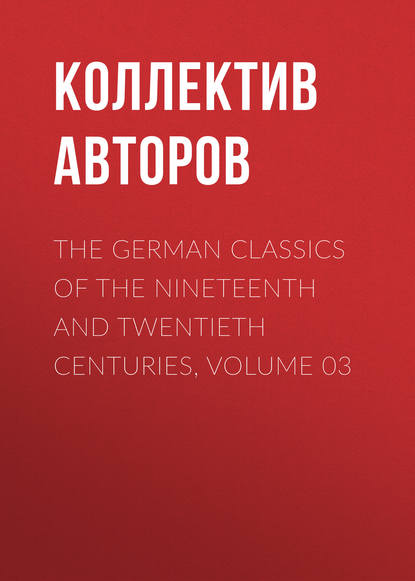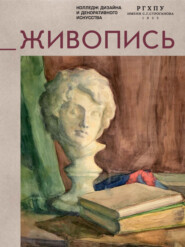По всем вопросам обращайтесь на: info@litportal.ru
(©) 2003-2025.
✖
The German Classics of the Nineteenth and Twentieth Centuries, Volume 03
Настройки чтения
Размер шрифта
Высота строк
Поля
After the completion of The Maid of Orleans Schiller was minded to try his hand on a tragedy "in the strictest Greek form." He had been deeply impressed by the art of Sophocles and wished to create something which should produce on the modern mind the effect of a Greek tragedy, with its simple structure, its few characters, and above all its chorus. But the choice of a subject was not easy, and for several months he occupied himself with other matters. He made a German version of Gozzi's Turandot and took notes for a tragedy about Perkin Warbeck. In the summer of 1802 he decided definitely to carry out his plan of vying with the Greeks. The Bride of Messina was finished in February, 1803. While he was working at it there arrived one day—it was in November, 1802—a patent of nobility from the chancelry of the Holy Roman Empire. It may be noted in passing that several years before he had been made an honorary citizen of the French Republic, his name having been presented at the same time with those of Washington, Wilberforce, and Kosciusko.
Among the later plays of Schiller The Bride of Messina is the one which shows his stately poetic diction at its best, but has proved least acceptable on the stage. As we have seen, it was an artistic experiment. A medieval prince of Messina has an ominous dream which is interpreted by an Arab astrologer to mean that a daughter to be born will cause the death of his two sons, thus making an end of his dynasty. When the child is born he orders it put to death. But meanwhile his queen has had a dream of contrary import, and thereby saves the life of her new-born daughter, but has her brought up remote from the court. In time the two quarrelsome brothers, ignorant that they have a sister, fall in love with the girl. One slays the other in a frenzy of jealous rage, the other commits suicide in remorse. This invention can hardly be called plausible. Indeed, so far as the mere fable is concerned, it is a house of cards which would collapse any moment at the breath of common sense. One must remember in reading the play that common sense was not one of the nine muses. The dreams take the place of the Delphic oracle, and the Greek chorus is represented by two semi-choruses, the retainers of the quarreling brothers, who speak their parts by the mouth of a leader, at one moment taking part in the action, at another delivering the detached comment of the ideal spectator. There is much splendid poetry in these pseudo-choruses, but it was impossible that such a scheme should produce the effect of the Greek choral dance.
Did Schiller feel that in The Bride of Messina he had wandered a little too far away from the vital concerns of modern life? Probably, for he next set to work on a play which should be popular in the best sense of the word—William Tell. It is his one play with a happy ending and has always been a prime favorite on the stage. The hero is the Swiss people, and the action idealizes the legendary uprising of the Forest Cantons against their Austrian governors. There are really three separate actions: the conspiracy, the love-affair of Bertha and Rudenz, the exploits of William Tell. All, however, contribute to the common end, which is the triumph of the Swiss people over their oppressors. The exposition is superb, there is rapidity of movement, variety, picturesqueness, the glamor of romance; and the feelings evoked are such as warm and keep warm the cockles of the heart. When the famous actor Iffland received the manuscript of the first act, in February, 1804, he wrote:
"I have read, devoured, bent my knee; and my heart, my tears, my rushing blood, have paid ecstatic homage to your spirit, to your heart. Oh, more! Soon, soon more! Pages, scraps—whatever you can send. I tender heart and hand to your genius. What a work! What wealth, power, poetic beauty, and irresistible force! God keep you! Amen."
With Tell off his hands Schiller next threw his tireless energy on a Russian subject—the story of Dmitri, reputed son of Ivan the Terrible. The reading, note-taking and planning proved a long laborious task, and there were many interruptions. In November, 1804, the hereditary Prince of Weimar brought home a Russian bride, Maria Paulovna, and for her reception he wrote The Homage of the Arts—a slight affair which served its purpose well. The reaction from these Russophil festivities left him in a weakened condition, and, feeling unequal to creative effort, he translated Racine's Phèdre into German verse, finishing it in February, 1805. Then he returned with great zest to his Russian play Demetrius, of which enough was written to indicate that it might have become his masterpiece. But the flame had burnt itself out. Toward the end of April he took a cold which led to a violent fever with delirium. The end came on May 9, 1805.
No attempt can here be made at a general estimate of Schiller's dramatic genius. The serious poetic drama, such as he wrote in his later years, is no longer in favor anywhere. In Germany, as in our own land, the temper of the time is on the whole hostile to that form of art. We demand, very properly, a drama attuned to the life of the present; one occupied, as we say, with living issues. Yet Schiller is very popular on the German stage. After the lapse of a century, and notwithstanding the fact that he seems to speak to us from the clouds, he holds his own. Why is this? It is partly because of a quality of his art that has been called his "monumental fresco-painting"; that is, his strong and luminous portraiture of the great historic forces that have shaped the destiny of nations. These forces are matters of the spirit, of the inner life; and they persist from age to age, but little affected by the changing fashion of the theatre. The reader of Schiller soon comes to feel that he deals with issues that are alive because they are immortal.
Another important factor in his classicity is the suggestion that goes out from his idealized personality. German sentiment has set him on a high pedestal and made a hero of him, so that his word is not exactly as another man's word. Something of this was felt by those about him even in his lifetime. Says Karoline von Wolzogen: "High seriousness and the winsome grace of a pure and noble soul were always present in Schiller's conversation; in listening to him one walked as among the changeless stars of heaven and the flowers of earth." This is the tribute of a partial friend, but it describes very well the impression produced by Schiller's writings. His love of freedom and beauty, his confidence in reason, his devotion to the idea of humanity, seem to exhale from his work and to invest it with a peculiar distinction. His plays and poems are a priceless memento to the spirit of a great and memorable epoch. Hundreds of writers have said their say about him, but no better word has been spoken than the noble tribute of Goethe:
For he was ours. So let the note of pride
Hush into silence all the mourner's ruth;
In our safe harbor he was fain to bide
And build for aye, after the storm of youth.
We saw his mighty spirit onward stride
To eternal realms of Beauty and of Truth;
While far behind him lay fantasmally
The vulgar things that fetter you and me.
* * * * *
FOOTNOTES:
[Footnote 1: Translated by Edward, Lord Lytton.]
[Footnote 2: This Sonnet, by the author of this sketch of Schiller's life, was written for the Chicago Schiller Celebration of 1905, but has not been printed before. EDITOR.]
* * * * *
POEMS
[All poems in this section are translations by Edward, Lord Lytton, and appear by permission of George Routledge & Sons, Ltd., London.]
* * * * *
TO THE IDEAL (1795)
Then wilt thou, with thy fancies holy—
Wilt thou, faithless, fly from me?
With thy joy, thy melancholy,
Wilt thou thus relentless flee?
O Golden Time, O Human May,
Can nothing, Fleet One, thee restraint?
Must thy sweet river glide away
Into the eternal Ocean Main?
The suns serene are lost and vanish'd
That wont the path of youth to gild,
And all the fair Ideals banish'd
From that wild heart they whilome fill'd.
Gone the divine and sweet believing
In dreams which Heaven itself unfurl'd!
What godlike shapes have years bereaving
Swept from this real work-day world!
As once, with tearful passion fired,
The Cyprian Sculptor clasp'd the stone,
Till the cold cheeks, delight-inspired,
Blush'd—to sweet life the marble grown:
So youth's desire for Nature!—round
The Statue so my arms I wreathed,
Till warmth and life in mine it found,
And breath that poets breathe—it breathed;
With my own burning thoughts it burn'd;—
Its silence stirr'd to speech divine;—
Its lips my glowing kiss return'd—
Its heart in beating answer'd mine!
How fair was then the flower—the tree!—
How silver-sweet the fountain's fall!
The soulless had a soul to me!
My life its own life lent to all!
The Universe of things seem'd swelling
The panting heart to burst its bound,
And wandering Fancy found a dwelling
In every shape, thought, deed, and sound.
Germ'd in the mystic buds, reposing,
A whole creation slumbered mute,
Alas, when from the buds unclosing,
How scant and blighted sprung the fruit!
How happy in his dreaming error,
His own gay valor for his wing,
Of not one care as yet in terror
Did Youth upon his journey spring;
Till floods of balm, through air's dominion,
Bore upward to the faintest star—
For never aught to that bright pinion
Could dwell too high, or spread too far.
Though laden with delight, how lightly
The wanderer heavenward still could soar,
And aye the ways of life how brightly
The airy Pageant danced before!
Love, showering gifts (life's sweetest) down,
Fortune, with golden garlands gay,
And Fame, with starbeams for a crown,
And Truth, whose dwelling is the Day.
Ah! midway soon lost evermore,
Afar the blithe companions stray;
In vain their faithless steps explore,
Among the later plays of Schiller The Bride of Messina is the one which shows his stately poetic diction at its best, but has proved least acceptable on the stage. As we have seen, it was an artistic experiment. A medieval prince of Messina has an ominous dream which is interpreted by an Arab astrologer to mean that a daughter to be born will cause the death of his two sons, thus making an end of his dynasty. When the child is born he orders it put to death. But meanwhile his queen has had a dream of contrary import, and thereby saves the life of her new-born daughter, but has her brought up remote from the court. In time the two quarrelsome brothers, ignorant that they have a sister, fall in love with the girl. One slays the other in a frenzy of jealous rage, the other commits suicide in remorse. This invention can hardly be called plausible. Indeed, so far as the mere fable is concerned, it is a house of cards which would collapse any moment at the breath of common sense. One must remember in reading the play that common sense was not one of the nine muses. The dreams take the place of the Delphic oracle, and the Greek chorus is represented by two semi-choruses, the retainers of the quarreling brothers, who speak their parts by the mouth of a leader, at one moment taking part in the action, at another delivering the detached comment of the ideal spectator. There is much splendid poetry in these pseudo-choruses, but it was impossible that such a scheme should produce the effect of the Greek choral dance.
Did Schiller feel that in The Bride of Messina he had wandered a little too far away from the vital concerns of modern life? Probably, for he next set to work on a play which should be popular in the best sense of the word—William Tell. It is his one play with a happy ending and has always been a prime favorite on the stage. The hero is the Swiss people, and the action idealizes the legendary uprising of the Forest Cantons against their Austrian governors. There are really three separate actions: the conspiracy, the love-affair of Bertha and Rudenz, the exploits of William Tell. All, however, contribute to the common end, which is the triumph of the Swiss people over their oppressors. The exposition is superb, there is rapidity of movement, variety, picturesqueness, the glamor of romance; and the feelings evoked are such as warm and keep warm the cockles of the heart. When the famous actor Iffland received the manuscript of the first act, in February, 1804, he wrote:
"I have read, devoured, bent my knee; and my heart, my tears, my rushing blood, have paid ecstatic homage to your spirit, to your heart. Oh, more! Soon, soon more! Pages, scraps—whatever you can send. I tender heart and hand to your genius. What a work! What wealth, power, poetic beauty, and irresistible force! God keep you! Amen."
With Tell off his hands Schiller next threw his tireless energy on a Russian subject—the story of Dmitri, reputed son of Ivan the Terrible. The reading, note-taking and planning proved a long laborious task, and there were many interruptions. In November, 1804, the hereditary Prince of Weimar brought home a Russian bride, Maria Paulovna, and for her reception he wrote The Homage of the Arts—a slight affair which served its purpose well. The reaction from these Russophil festivities left him in a weakened condition, and, feeling unequal to creative effort, he translated Racine's Phèdre into German verse, finishing it in February, 1805. Then he returned with great zest to his Russian play Demetrius, of which enough was written to indicate that it might have become his masterpiece. But the flame had burnt itself out. Toward the end of April he took a cold which led to a violent fever with delirium. The end came on May 9, 1805.
No attempt can here be made at a general estimate of Schiller's dramatic genius. The serious poetic drama, such as he wrote in his later years, is no longer in favor anywhere. In Germany, as in our own land, the temper of the time is on the whole hostile to that form of art. We demand, very properly, a drama attuned to the life of the present; one occupied, as we say, with living issues. Yet Schiller is very popular on the German stage. After the lapse of a century, and notwithstanding the fact that he seems to speak to us from the clouds, he holds his own. Why is this? It is partly because of a quality of his art that has been called his "monumental fresco-painting"; that is, his strong and luminous portraiture of the great historic forces that have shaped the destiny of nations. These forces are matters of the spirit, of the inner life; and they persist from age to age, but little affected by the changing fashion of the theatre. The reader of Schiller soon comes to feel that he deals with issues that are alive because they are immortal.
Another important factor in his classicity is the suggestion that goes out from his idealized personality. German sentiment has set him on a high pedestal and made a hero of him, so that his word is not exactly as another man's word. Something of this was felt by those about him even in his lifetime. Says Karoline von Wolzogen: "High seriousness and the winsome grace of a pure and noble soul were always present in Schiller's conversation; in listening to him one walked as among the changeless stars of heaven and the flowers of earth." This is the tribute of a partial friend, but it describes very well the impression produced by Schiller's writings. His love of freedom and beauty, his confidence in reason, his devotion to the idea of humanity, seem to exhale from his work and to invest it with a peculiar distinction. His plays and poems are a priceless memento to the spirit of a great and memorable epoch. Hundreds of writers have said their say about him, but no better word has been spoken than the noble tribute of Goethe:
For he was ours. So let the note of pride
Hush into silence all the mourner's ruth;
In our safe harbor he was fain to bide
And build for aye, after the storm of youth.
We saw his mighty spirit onward stride
To eternal realms of Beauty and of Truth;
While far behind him lay fantasmally
The vulgar things that fetter you and me.
* * * * *
FOOTNOTES:
[Footnote 1: Translated by Edward, Lord Lytton.]
[Footnote 2: This Sonnet, by the author of this sketch of Schiller's life, was written for the Chicago Schiller Celebration of 1905, but has not been printed before. EDITOR.]
* * * * *
POEMS
[All poems in this section are translations by Edward, Lord Lytton, and appear by permission of George Routledge & Sons, Ltd., London.]
* * * * *
TO THE IDEAL (1795)
Then wilt thou, with thy fancies holy—
Wilt thou, faithless, fly from me?
With thy joy, thy melancholy,
Wilt thou thus relentless flee?
O Golden Time, O Human May,
Can nothing, Fleet One, thee restraint?
Must thy sweet river glide away
Into the eternal Ocean Main?
The suns serene are lost and vanish'd
That wont the path of youth to gild,
And all the fair Ideals banish'd
From that wild heart they whilome fill'd.
Gone the divine and sweet believing
In dreams which Heaven itself unfurl'd!
What godlike shapes have years bereaving
Swept from this real work-day world!
As once, with tearful passion fired,
The Cyprian Sculptor clasp'd the stone,
Till the cold cheeks, delight-inspired,
Blush'd—to sweet life the marble grown:
So youth's desire for Nature!—round
The Statue so my arms I wreathed,
Till warmth and life in mine it found,
And breath that poets breathe—it breathed;
With my own burning thoughts it burn'd;—
Its silence stirr'd to speech divine;—
Its lips my glowing kiss return'd—
Its heart in beating answer'd mine!
How fair was then the flower—the tree!—
How silver-sweet the fountain's fall!
The soulless had a soul to me!
My life its own life lent to all!
The Universe of things seem'd swelling
The panting heart to burst its bound,
And wandering Fancy found a dwelling
In every shape, thought, deed, and sound.
Germ'd in the mystic buds, reposing,
A whole creation slumbered mute,
Alas, when from the buds unclosing,
How scant and blighted sprung the fruit!
How happy in his dreaming error,
His own gay valor for his wing,
Of not one care as yet in terror
Did Youth upon his journey spring;
Till floods of balm, through air's dominion,
Bore upward to the faintest star—
For never aught to that bright pinion
Could dwell too high, or spread too far.
Though laden with delight, how lightly
The wanderer heavenward still could soar,
And aye the ways of life how brightly
The airy Pageant danced before!
Love, showering gifts (life's sweetest) down,
Fortune, with golden garlands gay,
And Fame, with starbeams for a crown,
And Truth, whose dwelling is the Day.
Ah! midway soon lost evermore,
Afar the blithe companions stray;
In vain their faithless steps explore,
Другие электронные книги автора Коллектив авторов
Живопись




 0
0

















